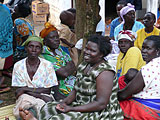Uganda: Slaves for 'Hire'
By Jody Ray Bennett for ISN
The Ugandan government on 5 August put into place an export ban on all private companies sending Ugandan women to certain Arab and near Eastern countries to work as maids. Some of the banned countries include Afghanistan, Iraq, Sudan, Saudi Arabia, the United Arab Emirates and Yemen.
According to the Ugandan newspaper external pageDaily Monitorcall_made, the ban is the result of the testimony of a 24-year-old Ugandan woman who claimed she was “tortured by her bosses after being decoyed by a private company to work in Iraq in May 2009.”
external pageThe daily also allegedcall_made that internal government sources confirmed that the Ugandan government helped this private recruitment company process and secure Iraqi work visas for 150 Ugandan women, many of whom later refused to leave Baghdad “citing the biting unemployment in Uganda.”
The 24-year-old woman who testified to the Ugandan parliament was external pageone of at least eight womencall_madewho were “rescued in a joint operation mounted by […] Ugandans working as guards of American bases and the US Marines serving in Iraq.”
The US Department of State and the United Nations High Commission on Refugees (UNHCR) have long external pagereportedcall_madeon women and children of the Ugandan external pageKaramojongcall_made, an agro-pastoral ethnic group residing in northeast Uganda who have largely been “sold as slaves in cattle markets or by intermediaries and are subsequently forced into domestic servitude, sexual exploitation, cattle herding, and begging” abroad.
Ongoing investigations external pagerevealcall_madethat the Ugandan women were recruited by a female “managing director” of Kampala-based Veterans Development Limited and were “reportedly told they were to work as secretaries or supermarket attendants, but when they arrived in Iraq, they were instead turned into domestic workers.”
In recent years, companies ranging in size and scope (both indigenous to Uganda or foreign-bred) have formalized similar labor activities that would otherwise become commodities on an international black market. Many of these companies operate as recruitment firms that seek to interview, vet and train Ugandan nationals for various employment opportunities abroad.
Through this process of formalization, the market for Ugandan labor becomes more transparent, thus allowing the state to more easily identify situations in which abuse and exploitation occur.
On the other hand, business interests are formalizing a rather suspicious market, often perceived as a form of international wage slavery that can justify or rationalize exploitation so long as the exploited are paid a wage.
The numbers game
But whether the unemployment rate is Uganda is as bad as suggested by the women who refused to leave Baghdad once their work visas expired, is questionable, at least when considering the official statistics.
external pageAccording to the latest reportcall_madefrom the Organization for Economic Cooperation and Development (OECD), between 2003 and 2006, the “official national unemployment rate was 2 percent, while the urban unemployment rate was 7 percent and the underemployment rate was estimated at 12 percent in 2006/07.”
This raises the question as to why Ugandan labor has become a significant national export alongside agricultural exports, which continue to sustain its largest source of income and which employs the majority - 67 percent - of the total labor force.
While Uganda enjoyed 6 percent economic growth last year, external pagea recent World Bank reportcall_madeindicates that “Uganda has the highest dependency ratio, i.e., the number of young people (under 16) and older people (over 64) who depend on people of working age (16 to 64) in the world.”
This helps explain why Ugandan nationals are searching for work beyond the domestic agricultural industry. Indeed, it is ironic that the rescue of the Ugandan women in Iraq was coordinated with other Ugandan private security personnel, another industry attracting Ugandan nationals to Iraq and elsewhere. The Christian Science Monitor reported earlier this year that thousands of Ugandans - both women and men - were being trained and groomed for private security detail throughout Iraq.
Indeed, the company that recruited the women, Veterans Development Ltd, boasts its talents in the Gulf region andexternal pageIndian business classifieds onlinecall_made with grammatical errors that make the company seem more like a classic 419 scam than a legitimate recruitment agency.
The situation highlights several issues regarding labor and migration as well as the Ugandan government’s ability to regulate these within its own space and beyond its own borders. With a female school external pagedropout rate nearing 50 percentcall_made that expands the pool of available young women to work in the private sector as secretaries or maids-turned-servants and slaves, the Ugandan government simply cannot act swiftly enough to curtail the perceived attractiveness of employment with the private sector, especially given that the country is external pagerequired to privatize industries to bolster its economycall_madein exchange for external pageIMF/World Bank loanscall_made.
Blurring the labor lines
While the government has placed an export ban on companies like Veterans Development, citizens searching for work can simply cross into neighboring Kenya where many of these companies are headquartered.
The political economy of labor in Uganda is a complex animal. As if scholars could not have found yet another industry to become “globalized,” international maid service in Uganda has blurred the lines between formalized labor, migration and human trafficking. Similarly, with regard to private military and security personnel, Uganda supplies western companies with a steady supply of employees for contingency operations around the world.
As long as financial dependency pressures Ugandan families to search for additional and/or supplementary employment, it might be expected that the Ugandan labor force population will transform itself into the a fast-growing pool of available employees in the global marketplace.

